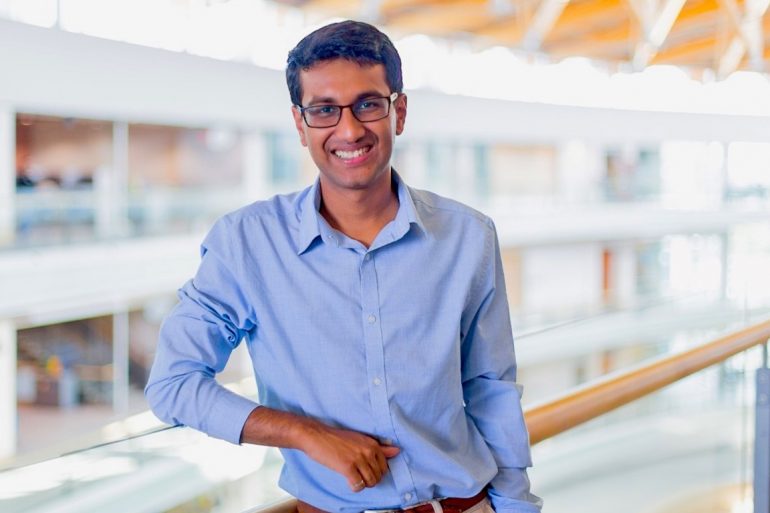Raaj Chatterjee always had his mindset on making a difference through technology. His passion for sustainability and the environment started in high school in Surrey, where he devoted 700 hours to community clubs and spearheaded several green initiatives. After receiving an $80,000 Schulich Leader scholarship to attend university, he chose Simon Fraser University’s School of Mechatronic Systems Engineering for the chance to create next-generation technologies that address social and environmental challenges.
“There are many ways to effect change, and the university is the time to try them all out,” says Chatterjee, who graduated this fall with a Bachelor of Applied Science.
A born networker, Chatterjee first used his engineering and people skills to help assemble the SFU student-driven Team Phantom. The design team invites students from any discipline to apply their skills toward building a zero-emission formula electric vehicle. The team has plans to compete in a championship race in California with their first vehicle next year. In addition to preparing for competition, Raaj worked with the team on collaborations between SFU and the City of Surrey to support events promoting renewable, clean energy and sustainable transportation.
As co-president of student advocacy organization SFU350, Chatterjee led a campaign calling for SFU’s endowment fund to divest from fossil fuels in favor of more environmentally conscious initiatives. In response, the university committed to reducing the carbon footprint of its investments by 40 percent by 2030.
“Being involved taught me how to advocate for the causes I’m passionate about and how to bring together and motivate others, too,” he says. “It helped me to find and build community on campus.” In 2016, he was selected as a finalist for Canada’s Top 25 Environmentalists under the age of 25 lists.
Last year, SFU recognized Chatterjee’s environmental advocacy with its President’s Award for Leadership in Sustainability. The award acknowledges Chatterjee’s efforts in building community well-being while generating solutions to complex global issues, thus connecting the social, economic, and ecological components of sustainability.
More recently, Chatterjee directed his talents toward developing assistive technologies for seniors. Through the Technology Entrepreneurship@SFU program, he co-founded Ruby, an interdisciplinary team that designs products for people experiencing essential tremor or cognitive impairments. The team’s first device is an easy-to-program remote control that eliminates complicated buttons and commands to make it easier to watch television.
His experience developing the Ruby Remote was inspired by lessons learned during five co-operative education internships, including one at Apple’s headquarters in Silicon Valley.
“I discovered a passion for user-centered product design and learned the importance of listening to customers’ needs,” he says.
For the next step in his mission to effect change, Chatterjee joined SFU’s eBrain Lab this fall as a graduate student, supported by three generous scholarships. There, he is researching technology-based solutions to mental health challenges, such as depression and addiction, and will carry out research that will address the lack of early diagnostic among youth. He hopes one day to launch a successful social venture to address either mental health issues or the climate-change crisis.
I’m grateful for the supportive environment that my peers and SFU created,” says Chatterjee. “Because of them, I aligned my passions with the change I want to see in the world. There’s nothing more valuable to me than that.”



